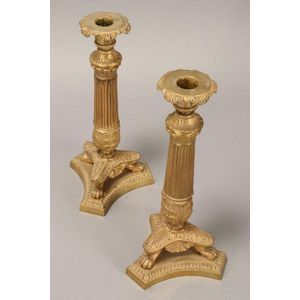French Empire Style Gilt Candlesticks (Pair)
Pair of French Empire style gilt candlesticks, the fluted columns set between an acanthus decorated capital and knop, set above three lion paw feet and raised on a concave triform base, height 10.63 in. (2)
You must be a subscriber, and be logged in to view price and dealer details.
Register Now to view actual auction price for this item.
- Acanthus - A stylized leaf motif, one of the primary decorative elements of classical Greek and Roman architecture, derived from the genus of flowering plants in the family Acanthaceae, native to tropical and subtropical regions of the Mediterranean area. It is a common element in classical Greek and Roman design, and is often seen in Corinthian and Composite order columns and used as a decorative element in English, European and Australian furniture, particularly on the curve of a leg, and as decoration for a corbel.
- Capital - In architecture, a capital is the topmost member of a column, pilaster, or pier, which sits on top of the shaft and supports the entablature or architrave above it. The capital is typically the most ornate and decorative element of the column, and it can take many different forms depending on the architectural style of the building.
In classical architecture, the most common types of capitals are the Doric, Ionic, and Corinthian. Doric capitals are simple and have a circular shape with a flat top and bottom. Ionic capitals have a more elaborate design with scrolls or volutes (spiral shapes) at the top, and Corinthian capitals are the most decorative, with elaborate carvings of acanthus leaves and other motifs.
In other architectural styles, capitals can take many different forms, such as the bell-shaped capitals of Gothic architecture or the foliate designs of the Romanesque period. The capital is one of the most important architectural element in a building, it is the one that gives the most character and identity to the building. - Empire Style - The Empire style was a version of neo-classicism popular from 1800 to 1830, coinciding with the rule of Napoleon I from 1840-15. In England the style corrosponds with the Regency style and in the United States to the Federal style.
The style is inspired by classical Rome and Greece, as reflected in the decorative motifs in the the design such as paterae, guilloches, acanthus and swags, and pieces are lavishly decorated with applied gilded decoration.
This item has been included into following indexes:
-
candlesticks, material
- gilt and bronze 261
- gilt and gold 167
